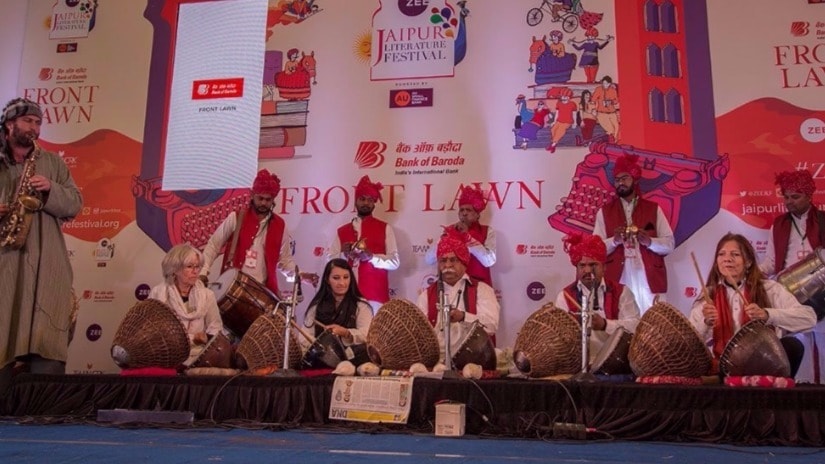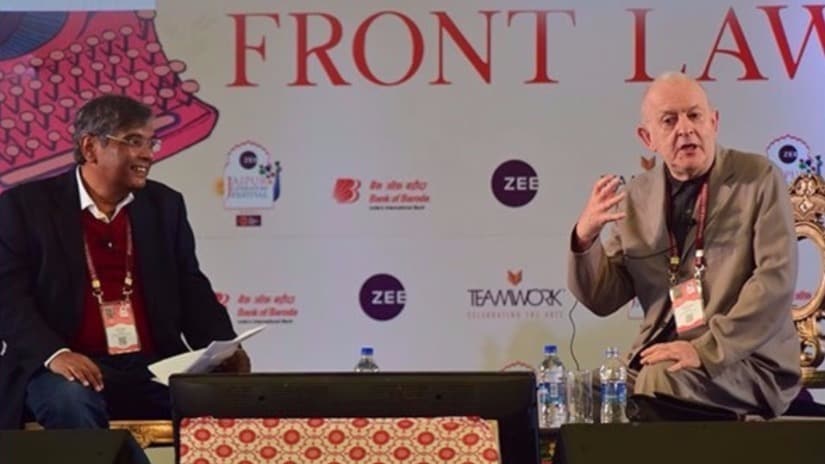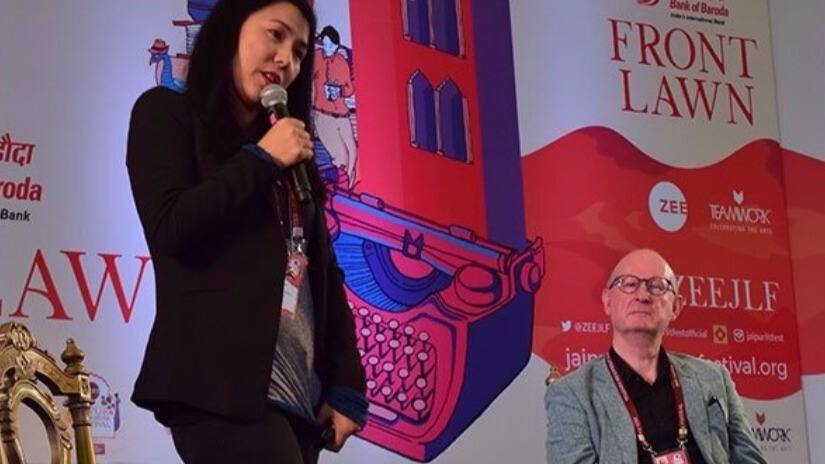There are few cities I love as much as Jaipur in the golden few hours of a winter morning. The sunlight filtering through the mist, the empty winding streets, the pastel colours of the old city… the place takes on a slow pace, like time itself has nowhere to get to. And it was indeed one such picture-book morning as I headed to the Diggi Palace Hotel, home to the Jaipur Literature Festival. In its 11th year, the festival has more or less reached the pinnacle of popularity when it comes to literary gatherings in the country. The attendance keeps getting bigger (too much so for comfort at times), the tents more impressive, the speakers more representative of the planet’s geography. The controversies too keep getting weirder. This year, it has to do with the thuggish, violent and seemingly out of government’s control, so-called “Karni Sena” outfit. In case you have been living under a rock or are from a foreign country, just Google the word “Padmaavat” or just click here , here or here . Yeah, that’s right. And all that because someone just wanted to showcase a movie ( panned by critics upon its hard-fought release, in case you were wondering) and a few who wanted to showcase their muscle, even more so as the various government elections approach. A holding at the entrance, which read “Jaipur Police Welcomes You”, took on a whole new meaning. Back at the literature festival, it was difficult not to hear the words “Karni Sena” mentioned every few minutes by someone or not notice the heavy police presence (props to them). Also, the chief minister of the state, Vasundhara Raje, gave the opening ceremony a miss. One can only wonder why. But I am getting a bit ahead of myself. Before I actually did enter the festival, there was the little, but quite crucial and often highly prone to mishaps, matter of collecting my press pass. And for the umpteenth time in my career, the festival pass gods p**sed on me. There was no pass to be had. Nothing in my name. What there was, was an army of volunteers. All courteous in that mechanical way they had been asked to be a few days ago (I too had been in their ranks in my younger days), none very helpful when an answer didn’t appear on the screens of their laptops. I was getting late, so I split with the promise of returning in a couple of hours for either the pass or some vengeance. [caption id=“attachment_4320849” align=“alignnone” width=“825”]  Meeta Pandit and Nathulal Solanki set the the tone for the Zee Jaipur Literature Festival with rousing performances on the first day. All photos courtesy Twitter/@ZeeJLF[/caption] A huge lamp was lit at 10.20 am — without the chief minister, but with some prayers. There were a bunch of people on the stage to do the deed, but it was difficult to tell who exactly they were, through the sea of heads gathered already at the venue on a Thursday morning (seemingly the reasons for one of the stages to be shunned to a different building altogether this year — not that I am complaining). Pico Iyer, looking sharp in a black suit, proceed to give the keynote address titled, Charting A World Without Borders. The British-born (to Indian parents) American talked about identity and the new kind of writers emerging in the contemporary world where the ‘past is rising against the future’. Bringing up Michael Ondaatje’s The English Patient (which turns 25 this year) and its diverse set of characters, Iyer talked about how literature is becoming even more indispensable in the times of Trump and rising toxic nationalism across the world. In a fast-moving world, he said, literature takes it slow. It makes one stop and contemplate, especially now when our global neighbourhood is under attack. Literature is important, Iyer concluded his address, as ideas can change the world, not drone strikes or guns. Jaipur Literature Festival 2018: From speakers' list to schedule, your guide to the 11th edition 11.10 am, and the sharp morning chill was already being pierced by the even sharper and high pitched sounds of ‘oh-my gods’ and ‘muahs’ as an entire generation got ready to take selfies and kisses flew across the venue. Girls in thick woollen tops with exposed midriffs and guys in leather jackets with bermuda shorts… just typing these combinations of words makes the knuckles of your truly’s turn blue. Also in abundance were high-school kids just trotting around. One observed, as a Kailash Kher song (’Teri Deewani’) was played at the venue (he had a performance scheduled later on) in between sessions, “He is so basic”. Meanwhile, a bunch of American high school girls were beyond thrilled when an Indian high schooler boasted that he remembered (and could recite) the lyrics to all (yes, all) the Lil Yachty songs. But something a little more in-depth was at hand when it came to music, as Philip Norman and Ajoy Bose took to the stage for a session on The Beatles’ time in India. Although the focus of the talk was mostly on the band’s time with Maharishi Mahesh Yogi and Ravi Shankar and how it influenced them, the conversation was sprinkled with anecdotes ranging from CIA conspiracies to a Lord of the Rings movie with the Beatles. [caption id=“attachment_4320851” align=“alignnone” width=“825”]  Philip Norman and Ajoy Bose in conversation at JLF[/caption] The two talked about the “hand of destiny” that brought the band to India in the first place, their travels across the country, the band’s complicated relationship with the Maharishi, the Beatlemania in the country and why, 50 years on, what compels us to still discuss the band in sessions like these. The session was concluded with a clip of Meghalaya chief minister Mukul Sangma belting out a Beatles song while the leader of the opposition joins him on the stage. Some sights. A session on fairy tales by Marina Warner was cancelled, so I substituted it with the closest thing I could find — a session on North Korea by Suki Kim (in conversation with Michael Breen). In an always fascinating insight into the country, Kim discussed how she went about writing her book Without You, There Is No Us: My Time with the Sons of North Korea’s Elite, while undercover, posing as an English teacher. The author went in-depth, talking first about the the absolute culture shock one experiences when in North Korea — the propaganda, the brainwashing, the surveillance, the militarisation of the state, the vast empty cities, “we are happy” signs on top of buildings; then what she personally experienced interacting with the students she taught and working in exceptionally regressive conditions. Her primary motive, she said, was to understand how the thinking process works for students born and raised in the country, who barely know anything of the outside world. Forcing them to write essays and in one case, showing them a Harry Potter movie (which surprisingly passed the state’s censorship), she tried to gauge their critical thinking abilities (unsurprisingly, they didn’t do very well). Unscripted moments were also rare in the country seemingly obsessed with death and doom. And if ever such moments occurred, they were quite fleeting. [caption id=“attachment_4320863” align=“alignnone” width=“825”]  Suki Kim speaks to Michael Breen about being undercover in North Korea[/caption] She also addressed the controversy that the book created upon its release, many believing that it betrayed journalistic ethics and put the school she taught at and the students under her at risk. According to Kim, if traditional reporting does not work in a situation, one has to adopt novel ways to get the story out. And as for the safety of the school and the pupils she taught — the school since expanded and as she never gave anything away regarding the identity of any of her students, it would appear they are safe and sound (as much as they can be in North Korea). It was about time to take care of my unfinished business. After about 45 minutes of standing at the counter, utter confusion, loss of entries from the system, re-entries and some more waiting, I was finally handed a press pass, much to the credit of a volunteer in an Arsenal sweatshirt (guess Sánchez’s departure has truly lifted the cloud over the club and its supporters), and none to couple of others just sitting around and generally being dismissive of anyone’s requests. Back inside, it was time for the big guns. First up, it was Kathy Reichs. Author of the bestselling Temperance Brennan series, the American crime writer, forensic anthropologist and academic talked how she got started with the series which also found its way to television in form of the popular show Bones. Reichs, who at times in the past, would be involved in as many as 75 real-life cases, says her intention was always to create a strong female protagonist who worked in forensics. She is also the co-author of the Virals series, a series of young adult novels she wrote with her son Brendan Reichs, which she hopes perhaps will inspire a younger audience to pick up a career in the sciences. With real-life cases and experiences blending into her fiction, as well as the TV show, Reichs talked about the difference between the real-life crimes and the fictionalised versions of the same. She also talked about how much of herself she sees in Brennan’s character. Overcoming the distraction of a monkey sitting on a tree near the stage, the author also mentioned her upcoming Temperance Brennan book (the 20th in the series), called the Conspiracy of Bones, and the new TV show pilot she has been working on based her stand-alone book, Two Nights. An intriguing session, well moderated by Amrita Tripathi. A tough combination any day.
Producer of the hit TV series 'Bones’, @KathyReichs, now in conversation with @amritat LIVE on Twitter. https://t.co/QGZeULZEz9
— jaipurlitfest (@JaipurLitFest) January 25, 2018
Tom Stoppard then took the stage with Sanjana Kapoor to discuss his life and work in a free-flowing session. Talking of Indian Ink, first published in 1995, Stoppard traced his journey from Czechoslovakia to Singapore to India and then finally to England. All this moving around and the experience that came with it, he confessed, made him feel exotic at his Yorkshire school. He also talked about his journey back to India after being away for years. Stoppard went on to talk about his experience working in a theatre, as well as, making movies; his admiration for John Wood; his routine (always busy, but not always productive); playwriting and being an artist; Brazil and his favourite screenplays of all time — Some Like It Hot and Chinatown. As the daylight began to fade and the cold intensified, the jackets and the teas came out. Although there were a few “JLF ka mood nahi ban raha bhai” (it doesn’t feel like JLF bro), mostly the crowd seem content with the new mega bazaar that had replaced one of the stages this year and the photography sessions at the entrance (and pretty much all across the venue), took on a new urgency with only the final sessions of the day left to go. Mihir S Sharma introduced the final session and the speaker — Nobel laureate Muhammad Yunus. The Bangladeshi social entrepreneur, with plenty of fans in the audience, talked about his book A World of Three Zeros: The New Economics of Zero Poverty, Zero Unemployment, and Zero Net Carbon Emissions and what it takes to lift people in need. Calling the current financial system one of the major causes of poverty, Yunus stressed the importance of goodwill and selflessness in business and society. His approach, he said, was to identify a problem and build a business around it to solve it. Making marginalised groups in the population — especially women — financially self-reliant is one of the driving factors of his social businesses. Yunus also talked about the various projects that his group is working on (the health sector, apart from the finance) and the approaching 10th anniversary of their Grameen Banks’ successful operation in the United States.
Nobel Laureate @Yunus_Centre in conversation with @mihirssharma talks about his beliefs, his inspirations and the challenges he has faced in ‘The Three Zeros’, now LIVE on Twitter.https://t.co/d8lJQ74iY3
— jaipurlitfest (@JaipurLitFest) January 25, 2018
The talk was repeatedly subjected to some of the most ear-splitting roars and applause coming from the venue right across where Rupi Kaur was in session. Some occasionally reliable sources report a scene right out of a voodoo ceremony (not that I would know anything about that) with a hypnotised young crowd snapping their fingers as some verses took a hold of their souls. Back at the Three Zeros session, there was a hint of optimism in Yunus’ words about the world that I have not heard much of in recent times. Indeed a great note to wind up a day on. And with that, out flowed the crowd with millions of Ubers being frantically booked and calls being made to “contacts” to “arrange” for music passes for the night. I didn’t attend the music night. I was too hungry, tired and cold to listen to — as I had gathered earlier in the day — some basic music.


)
)
)
)
)
)
)
)
)



